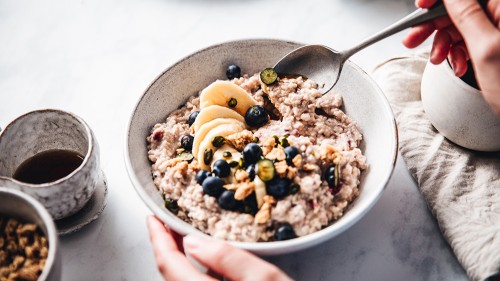WellnessVerge is reader-supported. We may earn a commission when you make a purchase through the links on this page. Learn more about our process here.
Plenity Review: A Promising Option for Weight Management
Last Updated on August 23, 2023
Medically Reviewed by Yasmine S. Ali, MD, MSCI
Plenity is an FDA-cleared weight loss aid that offers a new option for effective weight management for those who are overweight or have obesity.


Key Insights (TL;DR)
- Plenity is a prescription weight loss management aid designed to be taken before meals to help you feel full, so you can eat less and lose weight.
- Plenity promotes weight loss using natural ingredients without stimulants, which is common in many weight loss supplements. It is also a promising alternative to injections and prescription medication that come with a higher risk of severe side effects.
- Plenity is effective when taken with a healthy diet and exercise.
- In a high-quality clinical study lasting 24 weeks, the group taking Plenity had greater weight loss than participants who did not take Plenity (6.6% vs. 4.4% of their total body weight).
- While the study behind Plenity is promising, some customer reviews show that not everyone lost weight. This is expected as one treatment method can not be effective for everyone.
- If you want to try Plenity, you must meet specific criteria. Plenity offers a free telehealth consultation to determine if you qualify for a prescription. Depending on your state’s regulations, you may still need to meet with a doctor before you can buy Plenity.
What to Like About Plenity
- It’s FDA-cleared for safety and safe for most people.
- It’s backed by a well-designed clinical trial.
- The company offers online support and resources.
- Plenity doesn’t contain stimulants.
- No foods are off-limits diet-wise.
Important Considerations
- Out-of-pocket costs may not be covered by all insurance providers.
- Plenty may cause unpleasant side effects (like bloating).
- Long-term results of Plenity have not been studied.
- The company offers no refunds, as is typical with most prescription medications.
Plenity at a Glance
Plenity is an FDA-cleared weight loss aid. Plenity is the brand name of a patented product called Gelesis100. When it mixes with water in the stomach, it forms a gel that occupies 1/4 of the average stomach volume. The gel helps fill you up so you can eat less without feeling hungry. (1)
This happens because, when you eat, food goes from the stomach to the small intestines. Studies show that receptors in the small intestines detect when it’s being stretched and tell the brain to stop eating. (2) These stretch signals get triggered by the volume of food (not how many calories or nutrients it has).
Plenity contains two primary ingredients — cellulose and citrate. Cellulose is a type of fiber and is found in pretty much every plant-based food. In its natural state, cellulose is an “insoluble fiber,” meaning it doesn’t mix with water, and humans can’t digest it. (3)
However, in Plenity, cellulose is formulated with citrate, which allows it to absorb water in the stomach and mix with food during digestion. Rather than growing into a solid mass, Plenity forms thousands of tiny gel-like particles that take up space but don’t have any calories. The gel-like particles stay intact as they pass through the digestive system. Eventually, they are broken down in the colon and excreted.
How to Take
Plenity is packaged in individual pods with three capsules each. Patients are instructed to take all three capsules 20 minutes before lunch and dinner with 16 ounces of water (2 glasses). If you miss a pre-meal dose, the instructions recommend taking it immediately after your meal.
As you continue taking Plenity, you should start feeling less hungry in between and after meals, making it easier to cut back on snacking and eating large portions. It may take around four weeks before you start noticing any weight loss results from taking Plenity.
Who Plenity Is For
Plenity is intended for with a body mass index (BMI) between 25–40, which is a range considered overweight or obese. Plenity is meant to be taken with a healthy diet and exercise.
People who are allergic to any of its ingredients, have certain medical conditions, or are pregnant cannot take Plenity.
Patients must speak with a healthcare professional through the Plenity website (or their own doctor) to see if they are a good candidate for a prescription.
Plenity offers timely telehealth visits with healthcare professionals online, so it should not take long to be evaluated for approval.
Plenity's Weight Loss Effects: The Research Reviewed
Plenity's effectiveness for weight loss is based on the results of the company-sponsored Gelesis Loss of Weight (GLOW) study. This 24-week clinical trial divided 436 overweight and obese adults aged 22–65 into two groups — those taking Plenity and those taking a placebo pill. (1)
Both groups followed reduced-calorie diets (consuming 300 fewer calories than typical daily intake) and exercised 30 minutes per day. While both groups did lose weight by dieting and exercising, the Plenity group ultimately saw 2% greater weight loss compared to placebo.
Key Highlights From the Study:
- Plenity users lost an average of 6.4% of their initial body weight, compared to just 4.4% for the placebo group.
- Body Mass Index decreased by 2.1 points with Plenity vs. 1.5 points with the placebo.
- Waist circumference was reduced by 6.7 cm in the Plenity group and 5.0 cm in the placebo group.
- Nearly 60% of people taking Plenity lost an average of 22 lbs (10% of their body weight) over the 6-month study.
In summary, Plenity can support weight loss efforts but is not a substitute for developing healthy eating and exercise habits. Although the Plenity study showed promise, its results were not substantially better than the weight loss experienced in the group that just exercised and had a healthy diet. Still, Plenity may be effective with a good diet and exercise.
Safety and Side Effects
The most common side effects of Plenity may include abdominal pain, bloating, fullness, and flatulence. According to the clinical study, subjects on Plenity did not experience any more side effects than those on placebo. The side effects occurred within the first three months of the study and were resolved within two weeks without any consequences.
Plenity may affect how well your body absorbs other medications. When you speak with a health professional for your prescription, you can discuss the best times to take other meds.
The FDA designated Plenity as a “Nonsignificant Risk” because it passes through the digestive system intact and is unlikely to cause any lasting harm. (1) However, Plenity isn’t recommended during pregnancy or for anyone allergic to cellulose, citric acid, sodium stearyl fumarate, gelatin, or titanium dioxide. (4)
If you’re nursing or have diabetes, share this information with your Plenity prescriber to determine if it’s safe to take.
Cost and Insurance Coverage
Plenity’s cost is straightforward and listed at $98 for 4 weeks or $249 for a 12-week supply (providing you with a 15% savings for buying in bulk). You can choose to purchase either option once cleared for a prescription. Plenity offers free 2-day delivery to your home.
Plenity does not offer any money back or free trials since it is a prescription.
Some insurance carriers might cover the out-of-pocket expenses for Plenity — be sure to call your insurance provider and find out in advance. However, if your insurance won’t cover your costs, you may be able to cover some or all of them by using funds from an HSA, FSA, or MSA.
As mentioned, taking Plenity requires a prescription issued by your doctor or one of Plenity’s telehealth doctors. Plenity is unavailable at your local pharmacy and is only fulfilled and delivered by GoGoMeds, a mail-order pharmacy.
Comparison to Alternatives
Obesity does not affect everyone in the same way. Although Plenity is a promising treatment, it may not be suitable for everyone. Fortunately, there are other treatment options that work similarly by taking up space in the stomach to encourage eating less.
Below, we compare Plenity to two alternatives — Metamucil, an over-the-counter fiber supplement, and Orbera, a medically supervised program using an intragastric balloon.
It’s crucial to discuss the risks and benefits of each treatment with your physician before deciding what’s best for you. The information below is only meant to provide some direction for your research and points of discussion with your doctor:
| Plenity | Metamucil | Orbera | |
|---|---|---|---|
| What It Is | Cellulose and citrate in capsule form (considered a medical device) | OTC psyllium husk supplement (form of soluble fiber taken orally) | Non-surgical intragastric balloon (implanted for six months) |
| Main Effects | Takes up space in the stomach and intestines to reduce food intake, proven weight loss | Good for digestive health and possibly appetite/weight control | Takes up space in the stomach to reduce food intake, proven weight loss |
| Regular Price | $98 for 4 weeks | $13.44–$16.99 per 100-count bottle (varies by retailer) | $6,941 (average total cost based on data from RealSelf) |
| Discounted or Subscription Price | $249 for 12 weeks (15% savings) | 300-count bottles and generic/store brand versions available for discounted prices | Financing for “as low as $150/month” per manufacturer site |
| Covered by Insurance? | Maybe, check with your carrier* | No* | No* |
| FDA-Approved | Yes, designated as Nonsignificant Risk | Generally regarded as safe (GRAS) | Yes |
| Clinical Studies with Human Subjects | Yes | Yes | Yes |
| Gluten-Free | Yes | Yes | Yes |
| Vegan | No (porcine gelatin capsule) | No | Yes |
| Learn More | Visit Plenity | Shop on Amazon | Visit Orbera |
*You may be able to use HSA (health savings account) or FSA (flexible spending account) funds to cover some or all of the associated fees
Additional Options to Consider
You may find similar results (with added health benefits) by eating more fiber with every meal, specifically soluble fiber.
Soluble fiber naturally mixes with water to form a gel in the gastrointestinal tract. It’s been shown to promote weight loss and satiety, improve gut health, and lower the risk of heart disease, diabetes, and some cancers. (5, 6)
Most experts agree that getting fiber from food rather than supplements is best. (6) Good sources of soluble fiber include barley, beans, lentils, oat bran, and peas. In addition to diet, you can consider a fiber supplement such as Metamucil or Benfiber. Both are tested for safety, contain an adequate amount of fiber, and come from reputable brands.
To avoid discomfort and constipation, increase your fiber intake gradually. You’ll also need to drink plenty of water to support your gastrointestinal system when eating extra fiber.
At WellnessVerge, we only use reputable sources, including peer-reviewed medical journals and well-respected academic institutions.
- A Randomized, Double‐Blind, Placebo‐Controlled Study of Gelesis100: A Novel Nonsystemic Oral Hydrogel for Weight Loss - PMC:
https://www.ncbi.nlm.nih.gov/pmc/articles/PMC6587502/ - A good stretch regulates satiety | Nature Reviews Neuroscience:
https://www.nature.com/articles/s41583-019-0252-z - ScienceDirect: Cellulose:
https://www.sciencedirect.com/topics/earth-and-planetary-sciences/cellulose - FDA: DE NOVO CLASSIFICATION REQUEST FOR PLENITY:
https://www.accessdata.fda.gov/cdrh_docs/reviews/DEN180060.pdf - Soluble Dietary Fiber, One of the Most Important Nutrients for the Gut Microbiota - PMC:
https://www.ncbi.nlm.nih.gov/pmc/articles/PMC8624670/ - Dietary fiber: Essential for a healthy diet - Mayo Clinic:
https://www.mayoclinic.org/healthy-lifestyle/nutrition-and-healthy-eating/in-depth/fiber/art-20043983






